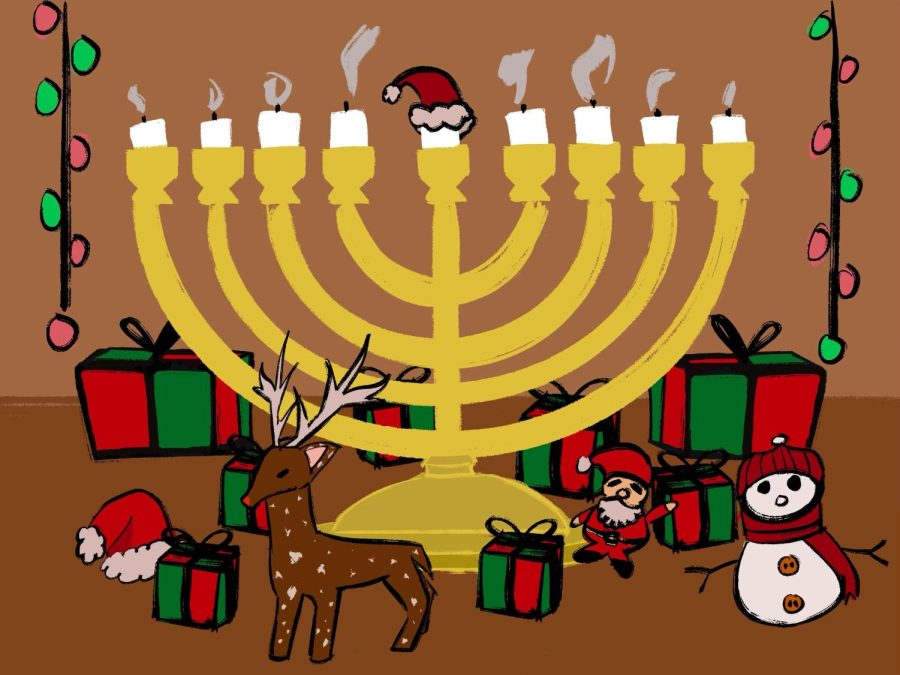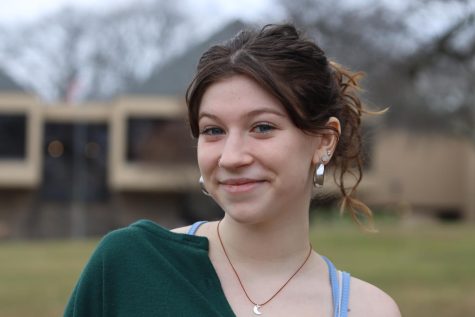Jews in Media
How Jewish Media affects us- and how it doesn’t.
During the holiday season, many people of Jewish descent feel underrepresented in the media.
December 11, 2022
Every child has had the experience of waking up to the snow falling in December, turning on their favorite Christmas movie, and sitting down with a cup of hot cocoa, awaiting the arrival of the 25th.
Well, maybe not every child, and certainly not most Jewish children, but we’ve been used to the lack of seasonal media since we were younger, as well as the lack of representation in the media in general.
Before diving into seasonal media, it’s important to recognize that generally in television, there’s a lack of Jewish representation aside from a ‘token Jewish character’; In the same ways other religions and minorities have a token character in shows, this can often be the only Jewish character. Not always, but they often represent historical stereotypes of a minority group. When Jewish people are put in the media they’re usually stereotyped as rich, loud, obnoxious, and out of touch with anything not involving Judaism. They take up all the common Jewish stereotypes we’ve been working to stop being associated with for decades.
Kaci Collins Jordan, one of the western religion teachers spoke about Jewish stereotypes in media. She said, “They all play into very, very, old and very negative stereotypes about Jews created by Christians. They go all the way back to the Middle Ages. The stereotype of Jewish people being greedy goes back to the fact that Christians often prevented Jewish people from having most professions in medieval European society.”
Even in children’s animated shows and Disney movies, there is ‘Jew-Coding’, where Disney villains constantly have notably dark features and large hooked noses, features which are considered Semitic. There’s also a lot of evidence to show that Walt Disney was very anti-Semitic. But, it’s important to know that there is some good Jewish representation of Jews in Disney; in Full Court Miracle, you can see some of the character’s kippahs in the trailer.
Tangled, the famous and loved Disney movie is eerily similar to stories of Christian children being stolen by Jewish women to practice their ‘dark magic’. But it’s not only tangled which has suspiciously ‘Jewish’ characters. Maleficent has horns like the ones commonly associated with Jews, Hades speaks in a thick New York accent and spits out words in Yiddish, and Ursula is just another villain with a hooked nose. The media’s portrayal of Jews in media is just training more anti-semitism, but, during the holiday season, there’s another problem altogether, which is the near complete absence of Jewish seasonal movies.
There’s never a lack of Christmas movies, decorations, and music, but when has there ever been a memorable Hallmark movie for Hanukkah? On this point, Collins Jordan said, “I think it has to do both with sort of the long history of antisemitism in Europe and the United States and with the fact that, in the U.S., Christianity has long been the dominant religion and by far the majority religion.” She continued, “Christianity has very much been the thing that has shaped our cultural institutions and so the result of that is that society is sort of built around Christianity.”
The movie coming out this year, Hanukkah on Rye, although seemingly good, is very clearly made for Jews to watch, and isn’t cast with Jewish characters. The movie still plays into very old stereotypes. However, the message itself is valuable and it is still a current representation. After all, what’s a Hallmark movie without some dramatic plot points and romance?
This isn’t the only Hallmark movie about Hannukah, they started coming out in 2019, but still, only two out of twenty-three movies a year even mention Hanukkah. The company
Collins Jordan said, “I comes back to Christianity being considered the mainstream thing and so you have this whole sort of market that has developed around Christmas and really commodified the dominant holiday.”
When seasonal movies are about Hanukkah, they’re more likely just Christmas movies with Hanukkah as a subplot, once again to tick off an inclusivity box, so they can say they’ve put out Jewish media. For young Jewish kids especially, this can be incredibly confusing.
Sarah Chernoff ‘23 spoke on this, saying, “I have worked at my temple’s Hebrew school all four years of high school with K-2. Every year around the holidays they ask me why we don’t have Hanukkah trees. They only see Christmas being represented in the public spaces around them.” She continued, “Specifically in school, they only do Christmas activities. This can be really confusing and upsetting to a five-year-old. They want to be able to experience the holiday fun with their classmates but their religion is not being represented in the same way.”
However, Lauren Marlowe ‘23 spoke from a different lens. She said, “A lack of representation has actually made me more proud in a sense. I am excited to share my stories of what’s going on, and I’m really involved with my Jewish identity outside of school and show what it is.” She continued, “It’s made me more proud of my Jewish identity.”
So what should we do? Well, first of all, everyone should try to be more aware of the fact that even though Christmas is the most widely known holiday, it doesn’t mean it’s the only one. There’s Hanukkah, Kwanzaa, and more. There’s not much that people can individually do to make a giant impact, but recognition is just as important as corporations and their impacts.
Maddy Israel ‘23 said, “I think as a child I was very much aware of my differences because of the fact that Christmas is so important and it’s so romanticized that I always felt very isolated, and I think especially in such a Jewish area we could definitely do a better job of making sure that Jewish kids know that they are not outsiders and that they don’t have to celebrate Christmas to be a part of a community and to be normal.”




